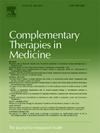Acupuncture as an alternative treatment for polycystic ovary syndrome: Effects on ovulation rate, pregnancy rate and endometrial receptivity
IF 3.5
3区 医学
Q1 INTEGRATIVE & COMPLEMENTARY MEDICINE
引用次数: 0
Abstract
Background
This study aimed to evaluate the effect of acupuncture treatment as an alternative therapy on ovulation rate, pregnancy rate, and endometrial receptivity in infertile patients with polycystic ovary syndrome (PCOS).
Methods
This was a randomized, single-blind, sham acupuncture-controlled clinical trial that included 134 patients who met the inclusion criteria for PCOS infertility. Both groups received letrozole as the base treatment, with the treatment group receiving additional acupuncture treatment twice a week and the control group receiving placebo acupuncture treatment throughout three menstrual cycles. The study collected data collection at baseline, at the end of treatment, looking at ovulation rate, pregnancy rate, sex hormone levels [follicle stimulating hormone (FSH), luteinizing hormone (LH), testosterone (T), estradiol (E2), prolactin (PRL)], endometrial receptivity (Salle Score), assessment of uterine using resistance index (RI), pulsatility index (PI) blood flow.
Results
The ovulation and pregnancy rate across treatment cycles of women in the treatment group were significantly higher than those in the control group (77.97 % and 49.74 % ovulation rate and 56.72 % and 29.85 % pregnancy rate across treatment cycles, respectively). Comparison of sex hormone levels showed a significant decrease in testosterone (T) levels in the treatment group (P = 0.005). In comparison of endometrial receptivity by Salle score, the total effective rate of the treatment group (86.4 %) was significantly higher than that of the control group (67.2 %), which was different between the two groups (P = 0.005). In comparison of PI and RI, the PI and RI of the treatment group were significantly lower than that of the control group (P < 0.001).
Conclusion
Acupuncture treatment can effectively improve ovulation and pregnancy rate across treatment cycles, reduce androgens, and regulate endometrial receptivity in infertile patients with polycystic ovary syndrome, a finding that supports the use of acupuncture as an alternative therapy for treating infertile patients and provides a reference for individualized treatment strategies.
针刺治疗多囊卵巢综合征:对排卵率、妊娠率和子宫内膜容受性的影响
研究背景:本研究旨在评价针刺治疗作为一种替代疗法对多囊卵巢综合征(PCOS)不孕患者排卵率、妊娠率和子宫内膜容受性的影响。方法:本研究为随机、单盲、假针灸对照临床试验,纳入134例符合PCOS不育纳入标准的患者。两组均以来曲唑为基础治疗,治疗组每周接受两次针灸治疗,对照组在三个月经周期内接受安慰剂针灸治疗。本研究收集了基线、治疗结束时的数据,观察排卵率、妊娠率、性激素水平[卵泡刺激素(FSH)、黄体生成素(LH)、睾酮(T)、雌二醇(E2)、催乳素(PRL)]、子宫内膜容受性(Salle Score)、子宫阻力指数(RI)、搏动指数(PI)血流量评估。结果治疗组妇女各治疗周期的排卵率和妊娠率均显著高于对照组(各治疗周期的排卵率分别为77.97 %和49.74 %,妊娠率分别为56.72 %和29.85 %)。性激素水平比较,治疗组睾酮(T)水平明显降低(P = 0.005)。子宫内膜容受性Salle评分比较,治疗组总有效率(86.4 %)显著高于对照组(67.2 %),两组间差异有统计学意义(P = 0.005)。比较PI和RI,治疗组PI和RI显著低于对照组(P <; 0.001)。结论针刺治疗可有效提高多囊卵巢综合征不孕症患者各治疗周期的排卵和妊娠率,降低雄激素水平,调节子宫内膜受受性,支持针刺作为治疗不孕症患者的替代疗法,为制定个体化治疗策略提供参考。
本文章由计算机程序翻译,如有差异,请以英文原文为准。
求助全文
约1分钟内获得全文
求助全文
来源期刊

Complementary therapies in medicine
医学-全科医学与补充医学
CiteScore
8.60
自引率
2.80%
发文量
101
审稿时长
112 days
期刊介绍:
Complementary Therapies in Medicine is an international, peer-reviewed journal that has considerable appeal to anyone who seeks objective and critical information on complementary therapies or who wishes to deepen their understanding of these approaches. It will be of particular interest to healthcare practitioners including family practitioners, complementary therapists, nurses, and physiotherapists; to academics including social scientists and CAM researchers; to healthcare managers; and to patients. Complementary Therapies in Medicine aims to publish valid, relevant and rigorous research and serious discussion articles with the main purpose of improving healthcare.
 求助内容:
求助内容: 应助结果提醒方式:
应助结果提醒方式:


